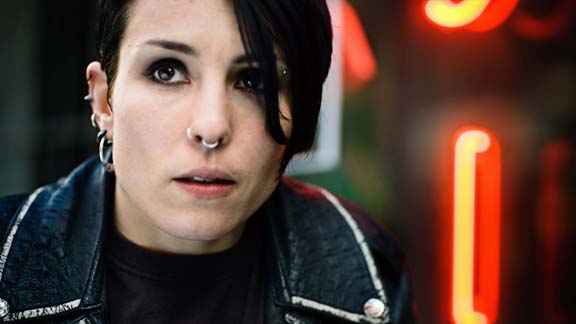Lisbeth Salander vs. The Powerful idea
Brad Fruhauff
 Lyle Enright thinks it's crazy not to take Lisbeth's craziness seriously.
Lyle Enright thinks it's crazy not to take Lisbeth's craziness seriously.
There’s something that I’ve noticed is often lacking when Christians talk about culture - namely, culture. There are several publications (I will not name-drop) that are more than happy to tell you how many f-words need to be spat before a film becomes anathema and just how much breast is considered “damning.”
Well, Relief doesn't believe f-words will cost you your salvation or that Genesis 2 should be X-rated; discernment isn't so simple. Take 2011’s The Girl With the Dragon Tattoo, an adaptation of the novel by Swedish author Stieg Larsson directed by David Fincher. It has profanity, nudity, brutal violence and human dysfunction pouring out from all sides. From a "Christian" (or, if you’re feeling snarky, White Anglo-Saxon Protestant) standpoint, one might wish to write it off as "bad" and so avoid it, but I’d like to focus on what the material and its themes mean in a fuller, more implicative light: what, exactly, does the film say about our world, our culture?
It’s a question worth asking considering how popular Larsson’s posthumously-published “Millennium series” has become since the first installment was printed in 2005. Young people and adults alike have turned page after gripping page through the stories of Lisbeth Salander and her encounters with murder, white-collar crime, trust issues, relational tension and (light this one up as the arguable theme throughout the series) sexual abuse. These are stories that are not afraid to examine the repercussions of some very dark and, despite the desires of many to believe otherwise, very real circumstances that combine to make a single young woman’s life nigh unbearable. To watch Lisbeth for even half an hour in Fincher’s film leaves you wondering just how this girl can cope with what happens to her.
Well, she doesn’t cope; she acts: after being raped by her ward and brutalizing him in retaliation, Lisbeth visits him one more time to remind him that she holds his reputation in the palm of her hand in the form of video evidence of his abuse. She demands that he fill out her psychological evaluations in more flattering ways, except that she does not seem to mind that he consistently calls her crazy. “Because I am crazy,” she announces.
This is the film’s stand-up-and-cheer moment - I know because that’s almost what I did. There is no other moment quite like it, nothing that comes as close to driving you to your feet on behalf of this be-inked heroine. As such, considering and coming to realize what you’re cheering for can be an almost mortifying process.
The fact is that Lisbeth has in a significant way placed herself in this situation; she has allowed herself to be abused for the sake of collecting evidence against her abuser. In a world where violence is cycled and recycled, Lisbeth has allowed herself to a part of the system for just long enough to discover the way out: “I am crazy.”
It is a paradigm that seems to be making its way into modern entertainment with more and more gusto. In this post-modern society, “The Madman” is the one who holds the secret truth, the way out. Even Nietzsche’s Übermensch has been replaced by The Joker. Indeed, if you were to take that archenemy of the Caped Crusader (courtesy of Christopher Nolan’s The Dark Knight, 2008), victimize him to the point of sympathy and recast him as a twenty-something young woman but leave the personality largely intact, you would not be very far off from the character of Lisbeth Salander. Why does this work?
Because insanity, says the philosophical climate of the day, is the way out; it is what breaks the cycle and allows us to not only cope with but transcend this karmic world that constantly victimizes us to be forever scarier than the things that scare us. It is a very bleak, very final way of looking at things.
But another way of going about it occurs to me - something with the same result but by drastically different means. Say what you will about U2’s Bono (I in no way wish to begin deconstructing and analyzing his character or beliefs here), he has a very appropriate last word to share on this topic:
“The universe operates by Karma,we all know that. For every action there’s an equal and opposite reaction:[but] Grace enters the picture to say, I’ll take the blame, I’ll carry the cross. It is a powerful idea: Grace interrupting Karma” (Bono in U2 by U2. London, 2006. Page 300).
Lyle Enright is an editorial intern with Relief. He will graduate in English from Trinity International University this spring.